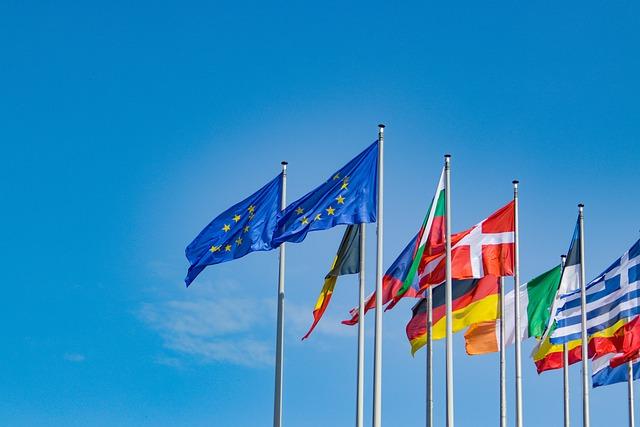In a decisive move reflecting escalating tensions surrounding the ongoing conflict in the Democratic Republic of Congo, the European Parliament is calling for a suspension of European Union aid to Rwanda. This development comes amid accusations that rwanda has provided military support to armed groups active in eastern Congo, further complicating an already volatile humanitarian and political landscape. The resolution, backed by a significant majority, underscores growing concerns among European lawmakers regarding Rwanda’s role in the crisis and the implications for regional stability. As the EU navigates its foreign aid policies, this potential freeze raises critical questions about the intersections of responsibility, accountability, and humanitarian assistance in one of Africa’s most troubled regions.
European Parliament’s Resolution on Aid to Rwanda Amid Congo Tensions
The European Parliament has taken a firm stance in response to the escalating tensions between Rwanda and the Democratic Republic of Congo (DRC). In a recent resolution, lawmakers expressed their concern over Rwanda’s alleged support for armed groups operating in eastern Congo. The Parliament’s call for a temporary freeze on EU aid to Rwanda is part of a broader effort to hold the Rwandan government accountable and to contribute to regional stability. The resolution highlights the urgent need for diplomatic engagement among all stakeholders to address the ongoing conflict and human rights violations in the region.
Lawmakers emphasized several key points in their resolution, including:
- The need for extensive investigations into human rights abuses linked to the conflict.
- A call for dialogue between the Rwandan and Congolese governments to ensure a peaceful resolution.
- A demand for accountability from both national and international actors involved in the conflict.
As tensions continue to mount, the international community is urged to remain vigilant and proactive in supporting peace initiatives, recognizing that significant regional implications could arise from the ongoing strife between Rwanda and the DRC.
background Context of the Rwanda-congo Conflict and Its Implications
The ongoing conflict between Rwanda and the Democratic Republic of the Congo (DRC) traces its roots to a complex interplay of ancient grievances and regional power struggles. After the 1994 Rwandan Genocide, millions of Rwandan hutus fled to eastern Congo, where tensions flared and various militia groups emerged, creating a volatile surroundings. Over the years, accusations have circulated regarding rwanda’s support for rebel groups in Congo, notably the M23 movement, which has been implicated in widespread human rights violations. This involvement is perceived not only as a means of asserting influence over resource-rich regions of Congo but also as part of a broader strategy to address security concerns stemming from armed groups operating along the border.
The implications of this conflict extend beyond the immediate region, affecting international relations and humanitarian efforts. The European Parliament’s recent call for a freeze on EU aid to Rwanda highlights the growing concern among European lawmakers regarding the humanitarian crisis and the responsibilities of state actors in the conflict. The potential suspension of aid could lead to several outcomes, including:
- Heightened economic instability in Rwanda, which heavily relies on international assistance.
- Increased tensions between Rwanda and the DRC, potentially escalating military confrontations.
- A shift in international partnerships, as Rwanda may seek alternative alliances or support from non-Western states.
EU Aid Dependency: Understanding Rwanda’s Economic Landscape
Amid ongoing tensions in the Great Lakes region, the European Parliament’s recent decision to propose a freeze on EU aid to Rwanda highlights the intricate web of international relations that shapes the nation’s economic landscape. Rwanda has historically relied on European Union funding to support various sectors, including education, healthcare, and infrastructure development. This dependence raises critical questions about the sustainability of Rwanda’s economic growth, which has frequently enough been portrayed as a success story in post-genocide recovery.Factors contributing to this reliance include:
- Foreign aid as a budgetary backbone: A significant portion of Rwanda’s national budget is funded through foreign aid, making the country vulnerable to geopolitical shifts.
- Investment in human capital: Aid has been pivotal for developing skills and education, which are crucial for Rwanda’s workforce.
- Infrastructure projects: Many infrastructure developments have been financed through EU grants and loans.
The potential suspension of aid raises alarm bells about the immediate impact on the Rwandan economy,particularly as it relates to social services and critical development initiatives. With a large portion of the population still dependent on government services funded by this aid, a sudden turnaround could adversely affect overall quality of life. Moreover, Rwanda’s ability to attract foreign investment could be compromised as investors frequently enough look for stability, not just economically but also politically. The following table illustrates the dependency on EU aid, showcasing its significance in various sectors:
| Sector | Percentage of Funding from EU aid |
|---|---|
| Education | 40% |
| Healthcare | 35% |
| Infrastructure | 50% |
Consequences of Aid Suspension for Humanitarian Efforts in Rwanda
the suspension of aid to Rwanda, as proposed by the European Parliament, poses significant risks to the already fragile humanitarian landscape in the country. Rwanda has heavily relied on international support to address various challenges,including health care,education,and food security.Thus, the cessation of funding could lead to immediate and severe consequences such as:
- Increased Poverty: Without aid, vulnerable populations may experience heightened poverty levels, exacerbating existing inequalities.
- Healthcare Crisis: Aid cuts could disrupt healthcare programs, threatening public health initiatives and access to essential services.
- Food Insecurity: Agricultural support programs may suffer, increasing food scarcity and malnutrition rates.
Furthermore, a prolonged suspension of humanitarian assistance may create a cycle of dependency and instability. The Rwandan government could struggle to maintain critical infrastructure and services, leading to social unrest and a deterioration in overall living conditions. The potential consequences might manifest in various forms, including:
| Consequences | Projected impact |
|---|---|
| Healthcare Access | Decline in service provision, increased mortality rates |
| Nutrition levels | Increased malnutrition and vulnerability among children |
| Social Stability | Potential rise in protests and civil discord |
Recommendations for a Diplomatic Approach to Stabilize the Region
To address the ongoing tensions in the region and promote lasting peace, a multifaceted diplomatic strategy must be employed. This approach should include:
- Engagement with Regional Leaders: Initiating dialogues with key political figures in both Rwanda and the Democratic Republic of the Congo to foster mutual understanding and cooperation.
- Strengthening multilateral Cooperation: Encouraging involvement from regional bodies such as the African Union and the Economic Community of Central African States (ECCAS) to facilitate mediation efforts.
- Incentivizing Peaceful Resolutions: Offering diplomatic rewards or developmental aid contingent upon verified progress towards peace agreements and the cessation of hostilities.
- humanitarian Support: Prioritizing assistance for affected populations by increasing funding for NGOs that focus on peacebuilding and community reconciliation efforts.
moreover, the international community must hold all parties accountable for their actions, ensuring that diplomatic measures are supported by clear consequences for violations of peace agreements. A collaborative framework could employ:
| Action | Responsible Party |
|---|---|
| Facilitate Peace Talks | International Observers |
| Monitor Compliance | United Nations Peacekeepers |
| Provide Conflict Resolution Training | Local NGOs |
| Implement Economic Development Programs | European Union and Member States |
Collaborative efforts that emphasize dialogue,accountability,and economic incentives can pave the way for a more stable and peaceful regional landscape. Such strategies are essential for not only addressing the immediate conflict but also for laying the groundwork for long-term prosperity and security in the region.
The Role of International Community in Addressing the Congo Crisis
The ongoing conflict in the Democratic Republic of the Congo (DRC) highlights the urgent need for a coordinated response from the international community. Historically, interventions have ranged from humanitarian aid to diplomatic pressure, yet the situation remains complex and multifaceted. International organizations, including the United Nations and regional bodies, play a crucial role in facilitating dialogue and promoting peace agreements. their efforts, though, can be hampered by political interests and resource constraints, which frequently enough lead to a disconnect between intentions and outcomes.
Moreover, the emphasis on increased accountability for actors fueling the conflict is paramount. The European Parliament’s recent move to freeze aid to Rwanda underscores a growing awareness among Western nations regarding their foreign aid policies. Such actions can serve as a catalyst for broader discussions around responsibility and sustainability in foreign assistance. Efforts should also focus on understanding local dynamics and ensuring that support is directed towards conflict resolution and reconstruction rather than exacerbating divisions. A more robust engagement strategy must incorporate both humanitarian aid and long-term development goals to foster a stable and peaceful Congo.
Key Takeaways
In light of the escalating tensions and humanitarian concerns surrounding the ongoing conflict in the Democratic Republic of Congo, the European Parliament’s call for a freeze on EU aid to Rwanda underscores a growing recognition of the complexities of international relations in the region. This decision reflects the Parliament’s commitment to uphold democratic values and human rights, while simultaneously addressing the serious implications of military and political interventions. As discussions progress, the implications for both European-Rwandan relations and the broader geopolitical landscape in Central Africa remain to be seen. Policymakers will undoubtedly need to tread carefully, balancing aid provisions with accountability measures to ensure that assistance does not inadvertently fuel further conflict. The situation requires ongoing scrutiny, as stakeholders strive to foster stability and peace in a region long affected by cycles of violence.

